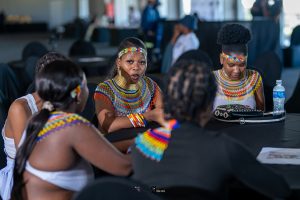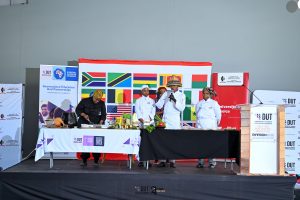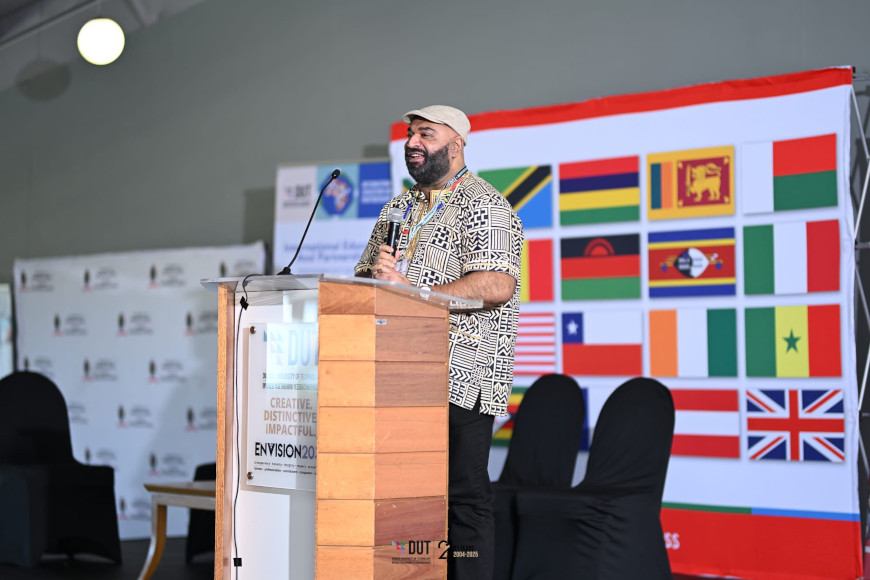On 30 May 2025, the Durban University of Technology (DUT), through its Directorate of International Education and Partnerships (IEP) unit, opened its doors not just to a celebration, but to a powerful regional declaration of intent. There was a vibrant collaboration with the University of KwaZulu-Natal (UKZN), Mangosuthu University of Technology (MUT), the University of Zululand (UNIZULU), and the eThekwini Municipality. Themed “Strengthening African Unity and Higher Education Collaboration,” the event brought together more than 400 delegates, made up of students and staff from all the participating universities, academic, community and the Municipality stakeholders.
Opening the event, Dr Lavern Samuels, Director of DUT’s Directorate of International Education and Partnerships unit, offered a warm and energising welcome to all in attendance. His reflections were rooted in a commitment to Pan-African unity, as he acknowledged the historic significance of Africa Day and the role that universities must play in shaping the continent’s shared future. Speaking to a room filled with students, scholars, and regional leaders, Dr Samuels framed the gathering as more than a ceremonial event, , saying it was a call to live out Africa-centred values through collaboration, innovation, and community upliftment.
His message resonated with DUT’s ENVISION2030 strategy, reminding the audience that values such as stewardship, engagement, and social justice are not abstract ideals but lived experiences that require active commitment. Dr Samuels celebrated the presence of young people, staff, artists, and institutional leaders in one space, noting that Africa Day is ultimately about affirming identity, reclaiming pride, and fostering belonging. Through his address, he reaffirmed the importance of African-led solutions to African challenges and the necessity of building strong regional platforms like the Africa Partnerships Universities Alliance (APUA) to sustain this momentum.
With the tone of unity and purpose set, Mr Cebolenkosi Duke Myeza, took to the stage as master of ceremonies. He had kickstarted the day’s vibrant proceedings and carried the audience smoothly through each transition, weaving together voices, performances, and reflections into a coherent celebration of African unity.
At DUT, the celebration was an embodiment of internal collaboration. The International Student Organisation (ISO) played a key logistical role in supporting and integrating international students throughout the event. Student governance structures, particularly the Clubs and Societies Office, worked hand-in-hand with the IEP event coordinators. Academic departments and units such as the Department of Consumer Sciences: Food and Nutrition, Maritime Studies, Biotechnology and Food Science in the Faculty of Applied Sciences, the Faculty of Accounting and Informatics (which featured their interactive humanoid robot), Video Technology, Fine Art and Jewellery Design from the Faculty of Arts and Design, including innobiz, all opened their doors and activated their spaces in support of the day.
The International and Governance Relations Department at eThekwini Municipality stepped forward as an active and visible partner, offering resources and broader community engagement that helped root the day in the civic life of Durban.
The academic panel session, chaired by Dr Dudu Shabane of DUT’s International Centre of Nonviolence, brought together diverse voices from partner universities to reflect on Africa’s academic future through the lens of knowledge reclamation, cultural affirmation, and institutional responsibility. A recent PhD graduate and a scholar rooted in peace, justice, and equity work, Dr Shabane anchored the session in DUT’s ENVISION2030 strategy, highlighting the role of academics in driving social transformation through ethical and engaged scholarship.
Professor Zoliswa Fikelepi-Twani, Head of the Department of Creative Arts at UNIZULU, contributed a powerful perspective on reclaiming African art forms as legitimate sites of knowledge. Whilst Dr Bhekani Buthelezi, a UNIZULU lecturer in musical theatre, echoed and extended this call by drawing on the deeply performative traditions of African societies. His reflections reinforced the need to reframe curricula in ways that honour and advance African creativity within scholarly spaces.
From MUT, Ms Mbali Mkhize, Senior Director for Marketing and Communications, shared how strategic communication can serve as a tool for institutional advocacy and public scholarship. She likely urged universities to tell their own stories in ways that affirm African agency, dignity, and excellence.
Dr Divinia Jithoo, DUT’s International Education Specialist, closed the session by positioning Ubuntu as both a philosophical anchor and an operational framework for internationalisation. Her input highlighted the need for collaborative, humanising models of partnership that centre African voices and priorities. In advancing this vision, her remarks tied directly to DUT’s commitment to ethical leadership and engagement as core values of ENVISION 2030, while challenging African institutions to operationalise Ubuntu, not just as rhetoric, but as praxis.
Further on, a student panel called: Student Reflections: Mobility, Belonging, and the Borders Within was held. Chaired by Benjamin Aye Simon, a PhD candidate in the Faculty of Health Sciences at DUT, the student panel unpacked the realities of intra-African mobility through deeply lived reflections. The session brought together emerging scholars from DUT, UKZN, and UNIZULU, each offering personal insights into navigating identity, policy, and belonging within the African higher education space.
Africa Day 2025 pulsed not only with ideas but with drums, voices, and vibrant bodies in motion. The celebration of cultural performances offered a symphony of tradition and youth energy, evoking rituals of the past and dreams of the future.
Going on into the day, in partnership with DUT’s INNOBIZ Centre for Innovation and Entrepreneurship, a student enterprise exhibition was showcased which revealed a new generation of young Africans who are no longer waiting to be invited into the future; they are building it.
If art and performance told the emotional story of Africa Day, the food exhibitions told the ancestral one, through taste, texture, and scent. Across the exhibition hall, three institutions, DUT’s Department of Consumer Sciences: Food and Nutrition, DUT’s Department of Biomedical Sciences, and the University of Zululand, offered a multisensory, research-driven experience that transformed indigenous ingredients into food futures.
The Department of Consumer Sciences: Food and Nutrition at DUT didn’t just showcase food, they staged it. Their live demonstration, Plating Up Change, was a 30-minute culinary performance that fused knowledge, heritage, and innovation. Trained student servers circulated with platters of tasters, offering every bite as both nourishment and narrative.
The surrounding exhibition, curated by Dr Nokuthula Vilakazi, Dr Evonne Singh, Noxolo Blose, and Zakithi Mhlongo, extended the experience, featuring laminated recipe cards, nutritional fact sheets, and an interactive question and answer space where traditional knowledge met applied science.
Not far from that buzz, DUT’s Department of Biomedical Sciences held its own quiet revolution in a corner booth alive with colour and continental scent. Their exhibit, prepared and hosted by both academic staff and students, offered tasters of cuisine not just from South Africa, but from across the continent.
Then came a contribution that could best be described as an agri-innovation meets community upliftment by the University of Zululand’s Department of Consumer Sciences, in collaboration with the Department of Biomedical Sciences, which offered an experiential tasting grounded in Indigenous African food science.
As the day drew to a close, Dr Jithoo offered her final remarks that reminded attendees that the work is only beginning. She urged universities to not only celebrate Africa Day but to use it as an annual checkpoint for institutional alignment with continental agendas, for reaffirming commitments to intra-African partnerships, and for listening more deeply to the students, artists, and entrepreneurs shaping the continent’s future.
The Africa Day 2025 celebration stood as a regional mirror reflecting Africa’s complexity, creativity, and courage.
Pictured: Dr Lavern Samuels, Director of International Education and Partnerships at DUT.
Photographer: Khulasande Tshayile
Sinamile Sithole/DUT IEP Team-Nonhle Mdlalose and Philile Mbamali.

